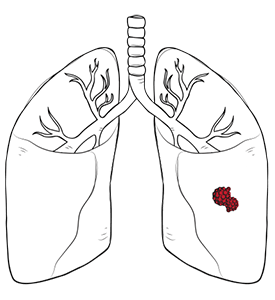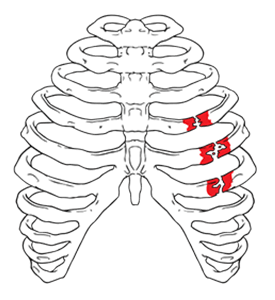

A rib fracture or broken rib occurs when one of the bones in the rib cage cracks or breaks. It is often caused by physical trauma, such as a car crash, a high fall, or an intense impact during contact sports. Rib fractures without trauma injury can occur in patients with bone cancer or osteoporosis. The seventh through tenth ribs are the most commonly fractured ribs.
The type of rib fracture depends on the injury’s nature and affects the treatment recommendations. A rib bone fracture can be classified as simple or complex, depending on how the bone is broken.

To diagnose your rib fracture, you will have to undergo an X-ray, or a CT scan to determine the nature of your injury. This also affects how urgent treatment is, as a complex fracture can have further complications if left unattended.
Often, people go for X-rays if they have recently experienced physical trauma like a motor accident or a high fall and experience pain in the torso area, especially when breathing or coughing.
Regardless of the severity of your rib injury, an assessment from a qualified healthcare practitioner is essential for effective rehabilitation.
A simple fracture, such as a hairline fracture, occurs when the bone remains in its original position but has cracked along its structure. Simple rib fractures typically do not require surgery and can be treated conservatively with pain medication.
Lifestyle adjustments may also be prescribed to aid the rib fracture healing process, particularly for athletes, to ensure a steady recovery and prevent further injury to the ribcage.
Since rib fractures can cause discomfort during breathing, your doctor may recommend breathing exercises to promote deep breathing. Prolonged shallow breathing can increase the risk of pneumonia.
A complex fracture is characterised by the displacement of the bone and the presence of a noticeable gap within its structure. These fractures pose greater risks and typically require surgical intervention to prevent additional complications.
For patients with three or more fractures and displaced rib fractures, surgery is often the recommended treatment, particularly when analgesia fails to alleviate the rib fracture pain. This is especially crucial when patients experience shortness of breath that compromises lung function.
Neumark surgeons will perform an open reduction and internal fixation in multiple rib fractures and displaced rib fracture treatment cases.
Open reduction and internal fixation of rib fractures is a surgical procedure that aims to realign the broken ribs and stabilise them using titanium plates and screws. This procedure plays a crucial role in facilitating the proper healing of the fractured ribs and enhancing the stability and functionality of the rib cage throughout the recovery period, preventing any shifting that could impede the body’s natural healing process.
These titanium plates will remain permanently and only in some patients will they be removed.
Symptoms of a rib cage fracture can vary depending on the severity of the injury, but common rib fracture symptoms may include pain, swelling, tenderness, difficulty breathing, bruising and discoloration, a cracking sensation, noticeable chest deformity and pain when applying pressure to the injured area.
A nondisplaced rib fracture is where the bone is cracked or broken, but the fractured segments remain in their normal position and do not shift or move significantly. Nondisplaced rib fractures are generally less severe compared to displaced fractures because the bones remain aligned. Although they can cause rib fracture pain and discomfort, they often heal without requiring surgery. Treatment typically involves rib fracture medication to manage pain and resting to allow the fracture to heal naturally.
Flail chest, also known as a floating rib fracture, is a term used to describe a severe fracture where three or more ribs located next to each other are fractured in two or more places, resulting in a segment of bone becoming detached and shifting independently. This condition can be potentially dangerous as it often leads to bruising of the lung tissue, causing significant impairment of respiratory function. Timely treatment is crucial in cases of flail chest, as acute lung injury can progress to complete respiratory failure, posing a life-threatening situation.
Fractured rib recovery time varies depending on the nature of the injury and the treatment received. Simple rib fractures treated with painkillers typically require a minimum of one month for the bone to heal. Healing time may be longer for complex fractures, and it will take significant time before normal activities can be resumed. Patients who undergo surgery may experience discomfort in the weeks following the procedure.
One of the key priorities during the healing process is to refrain from engaging in activities that could potentially worsen the injury or compromise the stability of the ribcage. It is crucial to avoid contact sports or any high-impact activities that carry a risk of further damage.
While it is important to remain mobile, it is equally important to avoid excessive strain. Patients experiencing breathing pain as a result of the injury should adhere to prescribed breathing exercises to prevent the development of lung-related complications caused by shallow breathing.
DISCLAIMER: The information provided on this website is for general informational purposes only and is not intended as a substitute for professional medical advice, diagnosis, or treatment. The use of this website does not create a doctor-patient relationship and no medical advice should be inferred or assumed. It is the user’s sole responsibility to seek the advice of their healthcare professionals for any medical concerns they may have and the user should not disregard, or delay, prompt medical advice for any such condition.
Neumark Lung and Chest Surgery Centre benefits from the expertise of a multidisciplinary team led by Dr Harish Mithiran, senior consulting thoracic surgeon at Gleneagles Hospital and Mt Alvernia Hospital.
Neumark is a lung and chest specialist centre with access to leading treatment modalities to achieve the best possible outcomes for lung disease and preventative patient screening.
Our foremost priority is to treat your condition as effectively as possible. Schedule a private consultation today; complete the form below, call, +65 6908 2145; WhatsApp, +65 9726 2485; or email, info@neumarksurgery.com.
Access the latest advice as well as full support throughout your treatment, and during after-care.
Learn how to refer a patient or to joining our physician network of leading providers in Singapore and abroad.
Main Surgery Centre
6 Napier Rd
#02-09 Gleneagles Medical Centre
Singapore 258499
820 Thomson Road
#06-07 Mount Alvernia Hospital Medical Centre A
Singapore 574623
Neumark Lung & Chest Surgery Centre benefits from the expertise of a multidisciplinary surgical team led by Dr Harish Mithiran, a senior consulting thoracic surgeon at Gleneagles Hospital.
With access to leading minimally-invasive treatment modalities for lung disease and chest conditions, our specialists in Singapore work to achieve the best possible outcomes for lung disease. Our foremost priority is to treat your condition as effectively as possible with world-class care.
6 Napier Road
#02-09 Gleneagles Medical Centre
Singapore 258499
820 Thomson Road
#06-07 Medical Centre A
Singapore 574623
© 2024 Neumark Lung & Chest Surgery Centre Pte. Ltd. | UEN 202136971R
Gleneagles Medical Centre
6 Napier Road
#02-09 Gleneagles Medical Centre
Singapore 258499
Mount Alvernia Hospital
820 Thomson Road
#06-07 Medical Centre A
Singapore 574623